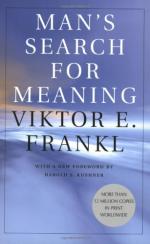
|
| Name: _________________________ | Period: ___________________ |
This test consists of 5 multiple choice questions, 5 short answer questions, and 10 short essay questions.
Multiple Choice Questions
1. What does the author claim hurts most about the physical blows from SS officers?
(a) The unfairness of the blows.
(b) The way that the officers hit prisoners where they were already injured.
(c) The way in which the SS officers did not speak to the prisoners before beating them.
(d) The use of sticks to hit the prisoners.
2. Why did prisoners try to get to the center of the lines that workers formed in the morning?
(a) To avoid being seen by the SS.
(b) They could neither be punished for arriving early nor beaten for arriving late.
(c) Large blocks of people were always selected from the center, so friends could remain together.
(d) For the warmth in the center of the group.
3. What did the prisoners think of indoor work?
(a) It was the worst work in the camp because of the constant contact with the SS.
(b) It was the best work in the camp, since it was in a sheltered room.
(c) It was difficult because of the close watch the SS kept on prisoners inside.
(d) It was the hardest work because it separated the prisoners.
4. How does the friend of the author, who "smuggled himself" into the author's hut, suggest that the prisoners try to stay alive?
(a) He recommends that they sleep every moment that they get a chance, to be energetic in their work.
(b) He recommends they shave, to look younger, and that they avoid showing discomfort to appear more fit.
(c) He suggests that they never speak around SS officers.
(d) He offers them tips to get more food at meal time.
5. What were the exceptions to the "cultural hibernation" in camp?
(a) Writing and music.
(b) Politics and religion.
(c) Religion and writing.
(d) Art and music.
Short Answer Questions
1. Who narrates this story?
2. What was the "most ghastly moment of the twenty-four hours of camp life"?
3. Who does the author describe smoking in the concentration camps?
4. Frankl was sent to another camp after his stay in Auschwitz. Why were the prisoners there pleased?
5. When Frankl was scheduled to be transported to another camp, what did the chief doctor do?
Short Essay Questions
1. In the first section of the text, "Experiences in a Concentration Camp," what groups does Frankl identify within the concentration camp? Which group does he focus on? Why?
2. How does Frankl categorize the psychological response to such an abnormal situation as life in a concentration camp?
3. In "Experiences in a Concentration Camp," what does Frankl write happened when a train was prepared to transport prisoners?
4. How did the SS respond to changing the list of prisoners who would board transport that would transfer prisoners to another camp or would send them to the gas chambers?
5. What kind of curiosity does Frankl write that the prisoners had?
6. According to Frankl, what were the communal showers like? What was the attitude of the prisoners as they entered their first communal shower? Why is this important to Frankl?
7. In the section on "Experiences in a Concentration Camp," Frankl describes a physical condition that affected "nearly all the camp inmates." What was this condition? How did it affect Frankl?
8. After the initial mental phase that was characterized by shock, what characterized the second phase that Frankl noticed in his fellow prisoners and in himself?
9. What does Frankl claim is the difficulty of his attempt at a methodical presentation of the psychology of the prisoner?
10. Due to the difficult conditions and the need to fight for survival, which prisoners does Frankl claim were most likely to survive life in the concentration camp?
|
This section contains 1,362 words (approx. 5 pages at 300 words per page) |

|




